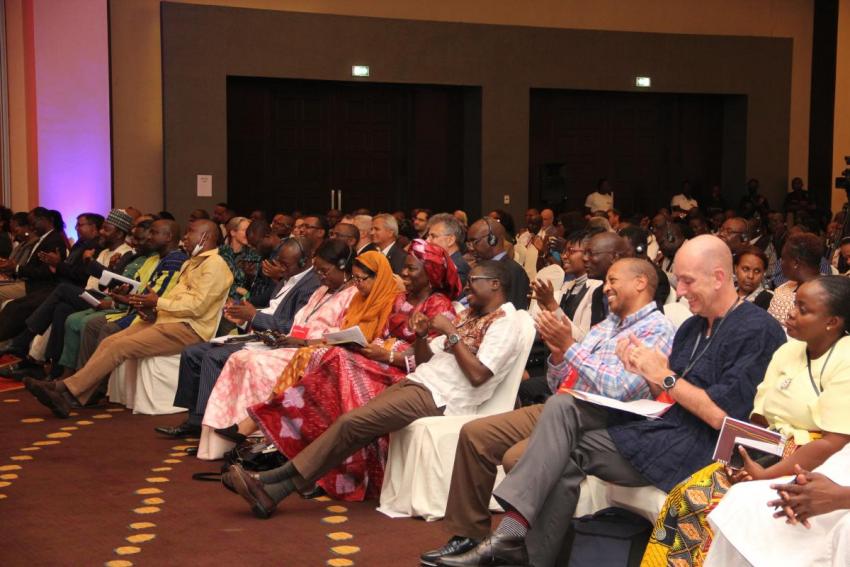Uganda and broader Africa perspectives on the All systems go Africa symposium.
Published on: 07/11/2022
African States have committed to reduce by 95% the proportion of the population without access to safe and adequate water supply and sanitation by 2025 (UN Water/Africa, 2000), and to ensure availability and sustainable management of water and sanitation for all by 2030 (UN SDGS, 2015). The deadline is close and there is acceptance that Sustainable Development Goal 6 on safe water, sanitation and hygiene targets may no longer be achievable by 2030. Over 95 million Africans continue to live with no access to safely managed water and a further 504 million without safe sanitation services.
Uganda’s promise for safe and sustainable water, sanitation and hygiene services is executed through its National Development Plan III with a target of increasing access to safe water supply to 85% by 2025. But as with other African States, the WASH system is failing due to underlying issues ranging from an increasing population growth rate that is higher than investment in water, sanitation and hygiene services, to non-functionality accruing from short-term, poorly managed infrastructure that cannot cope with climate impact and economic development.
For three days, 19 – 21 October 2022 in Accra, Ghana, at the All systems go Africa, experts, practitioners, politicians and development partners deliberated on what must change to ensure that 1.5 billion people living in Africa can all [without exception] take safely managed water supply and sustainable sanitation services for granted.
“As a government we want to commit resources to the WASH sector with an emphasis on maintenance and sustainability. Because what is the point of moving up in figures of percentages and then go back down because systems have broken down?” – Hon. Cecilia Abena Dapaah, Minister of Sanitation and Water Resources, Republic of Ghana and host of the symposium.
Impassioned discussions focused on WASH systems strengthening – from the institutions and policies that define the structures for each country, to the innovative technology that can deliver resilient services amidst climate change. From home-grown financing strategies to airtight planning and monitoring that help to chart progress towards national and continental goals.

Participating in the symposium from Uganda were representatives from the Ministry of Water and Environment, National Planning Authority, civil society umbrella Uganda Water and Sanitation Network, as well as IRC and Water For People in Uganda.
Uganda has reported exponential progress in the water and environment sector with the national safe water coverage estimated at 69% by June 2021. Sanitation coverage was 80% and the population having hand washing facilities with soap and water was above target at 124% (UGA-MOFPED Water and Environment Sector Budget Monitoring Report, 2021)
While the figures from Uganda - as from many African States - are impressive, the quality and functionality of WASH services remains wanting. WASH infrastructure quickly become white elephants because they are made as short-term reactive interventions, disregarding the whole systems approach. Could the All systems go Africa have been just another talking shop? I spoke to some delegates from Uganda about what the country can learn and what it is bringing to the table that other African states can learn from.
“We all agree that building more water sources without a sustainable plan for management will not take us there. In Uganda implementing the Umbrella authorities model has taught us that people are able and willing to pay for safe water supply services if they are professionally managed, and if operations and maintenance of the infrastructure is guaranteed. The umbrella authorities are delivering sustainable functionality by ensuring adequate maintenance, revenue collection and reinvestment.“ – Eng. Herbert Nuwamanya, Assistant Commissioner in-charge of Utility Management Division, Ministry of Water and Environment, Uganda.
“I have realised that African countries have similar WASH challenges; the lack of quality data that would ensure a robust monitoring and evaluation framework. Silo operations that have led to prioritization of investment in water supply, at the expense of sanitation and hygiene. The symposium rightly illuminated the need for a multi-actor, integrated, complementary and synergistic approach to WASH service delivery. Uganda’s programmatic approach to planning is addressing that.” – Ronald Kaggwa, Manager Production Trade and Tourism Planning at the National Planning Authority.
“WASH services are fundamental human rights, not a favour by governments to the people. Uganda brings to the table a unique lesson for systems strengthening where civil society have a mainstreamed working relationship with government and can through UWASNET facilitate budget transparency, joint monitoring, reporting and collaborative projects for improved service delivery.” – Yunia Musaazi, Executive Director, UWASNET
“National and sub national linkages need to be strengthened in terms of planning, partnerships, monitoring and reporting so as to have a complete service delivery loop and to align the national and global priorities of universal access to WASH, as we discussed in Thematic Area 1. Uganda can learn from Ghana on being deliberate in increasing financial investment in the sanitation economy.” – Martha Naigaga, Senior Sanitation Coordinator in the Ministry of Water and Environment, Uganda.
Indeed, there is much to be done yet. And the solutions are available within the African experience, expertise and leadership.
“This is the beginning of a lasting coalition. With strong political leadership from the very top and effective collective action, we can and must turn things around,” - Dr Patrick Moriarty, Chief Executive Officer of IRC.
The #AllSystemsGoAfrica was applauded as a timely ignition for the water, sanitation and hygiene systems revamp, that will deliver the promise of universal access.
“This, for me, is testimony that our African WASH Experts are alive to their responsibilities and are poised to spur Africa on to achieve the SDG 6 by the year 2030” - H.E. Dr. Mahamudu Bawumia, Vice President of the Republic of Ghana, and Chief Guest at the All systems go Africa symposium.
At IRC we have strong opinions and we value honest and frank discussion, so you won't be surprised to hear that not all the opinions on this site represent our official policy.